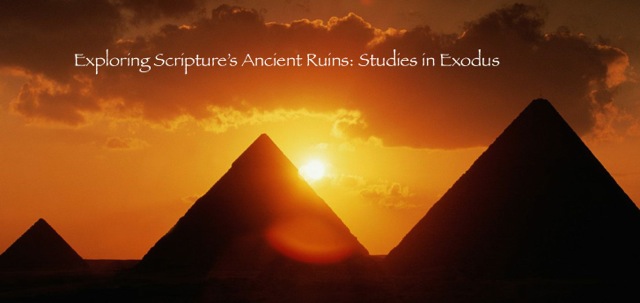©1998-2015
Fellowship@Cross Creek
Life of Moses
A Most Divine Wedding: Part III: The Vows…
Ex 20:1-7
7/20/3; ed. 6.21.15
General Introduction: Moses, led by God, is leading the children of Israel, perhaps as many as 2-3 million strong, away from Egypt and closer to the land promised to their forefathers seven centuries before. Their journey has not been without its problems. Having overcome food and water issues, a threatening military foe and leadership issues, God’s people have now reached his mountain, the place where Moses was called by God to lead them out of Egypt in the first place.
The Bride, Israel, having ritually purified herself and refrained from having sexual relations with each other, via her leadership, approaches her Groom’s mountain and prepares to take her vows—the covenant.
Exod. 20:1 And God spoke all these words:
2 “I am the LORD (Yahweh…I AM) your God, who brought you out of Egypt, out of the land of slavery.
Why does God need to identify himself? Because he is invisible? Could the people hear his voice? Or could only Moses hear? What about Aaron? The elders?
Notice he reminds them that he is the One that is responsible for bringing them out, as an entire nation, from slavery in Egypt—a truly remarkable occurence?
3 “You shall have no other gods before me.
The Groom, Yahweh God, demands his bride’s respect.
I brought you out of Egypt. No other god did this. I defeated mighty Egypt and its plethora of gods and goddesses. I and I alone, and therefore, I demand exclusivity?
No other gods…kind of like marriage…no other mate…only one. Why? If they had compromised, which they will, or if God allowed other gods to be worship, adored, thanked or recognized, what would happen to Israel? A weakened faith or trust in the one true God?
4 “You shall not make for yourself an idol in the form of anything in heaven above or on the earth beneath or in the waters below.
You can’t create your own gods. You can’t make up your own worship, faith, religion or values. To do so would be worship yourself, because no doubt, you created your own gods.
You may be tempted to value or worship creation—no doubt, it is amazing with all its beauty, order and design–but don’t. It may be marvelous, but it is NOT to be worshipped as I am worshiped, adored or respected.
5 You shall not bow down to them or worship them; for I, the LORD your God, am a jealous God, punishing the children for the sin of the fathers to the third and fourth generation of those who hate me,
He goes on to stress exclusivity. Usually jealousy is seen as a negative trait, but not here.
Why? Again what if God allowed his creatures to worship or value other things, idols, things in nature? What would or could be the result?
1) They would be wrong. You can pray to the sun all day long, but the sun can’t hear or respond to your prayer.
You can sacrifice your child to the sun, but it won’t make one bit of difference to the sun.
2) You can then create your own system of rules and rituals—your own religion, so to speak—perhaps even a religion, on a human level that for a time, makes more sense or is more pleasurable than the religious moral structure that I, Yahweh God, am giving you, but again, it is a lie.
In other words, Man, the created, seemingly unleashed from his Creator, can conceive of his own man-made religious value system, in which he, in what he defines as a perverted spiritual act of worship, can combine his lust for sexual pleasure with his hopes of obtaining a particular nature god’s favor, so that his crops or efforts may be blessed by that particular pseudo-god. Sounds great, but, it won’t work.
3) And certainly, by foolishly attempting to adjust or distort God’s true moral, religious, protective values and boundaries, which to some degree ought to and does lead to natural guilt or shame or infectious disease or an ever-increasing desire or addiction for more and more immoral pleasure (because no overly-indulged pleasure will ever be enough) regardless of whom it hurts, the creature risks destroying not only himself, but others as well.
I talked with a guy recently (2003) that has struggled with an almost thirty-year drug habit that began in high school. I can’t imagine the pain his parents and siblings have endured over the years.)
And therefore, within the covenant or vows, notice that there is a tremendous cost for Spiritual unfaithfulness. Is this cost an attempt to protect the entire community from the greater consequences of an out-of-control, insidious and deceptive immoral contagion?
And does this punishment affect all peoples or just the Israelites?
In other words, is this true today?
God seems to be saying this is the way I am—my personality!
Once I lose my patience, my anger or response is or must be harsh to fit the severity of the disease or potential outbreak.
My judgment will seem merciless.
Some would say that this seems unfair to punish later generations for their fathers’ sins?
What kind of punishment? Personal or national?
Are these natural consequences? In other words, if a drunk destroys his family, does this have lasting consequences on his family because he was not there or created significant damage while he was there?
Notice, he says, “…those who hate me.” These are strong words.
Is the choice to worship other gods a choice to hate God?
Most would not see it as this.
Most today would just see it as a little friendly addition to man’s religious experience.
Chill God.
But God is saying, “I am the ONE, and there is no other. Either love ME. Worship ME, or love, value and worship something else. There is either ME or not ME. You choose. There is no compromise.
Again why is this true? Why is God so serious about this?
6 but showing love to a thousand [generations] of those who love me and keep my commandments.
On the other hand, just as Yahweh’s judgments for his bride’s spiritual apostasy seem harsh, those judgments pale in comparison to his wealth’s reward for her faithfulness.
Notice he defines her love for him by her keeping his commands.
In other words, true love is reflected in one’s actions, not just one’s words or sentiments.
Love is shown, just not spoken, felt or experienced. Love is demonstrated.
“Show me the money!” Show me the love. Prove your love. Demonstrate your love.
So why keep commands to prove one’s love?
How does this apply to parents? An employer? Teacher? Coach?
With respect to these initial marriage vows, does each generation need to remain faithful?
Or does this mean that the natural consequences of each generation doing its job is that each generation passes on its values to its children, thus ensuring that the next generation and each succeeding generation will remain faithful to God?
Or does this refer to heaven or perhaps Christ’s thousand year kingdom as described in Rev. 20? That, what God is really saying here is that he is eternally blessing those that remain faithful to him?
7 “You shall not misuse the name of the LORD your God, for the LORD will not hold anyone guiltless who misuses his name.
Here is an interesting command–the fourth command.
Not only will you not worship another god or make one or bow down to one, you also will not misuse my name.
For generations many have applied this one to cursing or cussing or profanity.
For example, does this refer to a term such as Godd-mn or godd-mn?
In essence when one uses this term, he could be asking the God or a god to damn or curse someone.
In other words, probably because you hurt or disparaged me or my character, the supplicant is asking God to hurt or curse the person who hurt or cursed them.
Obviously, most seemingly use it as an explicative or reaction to something going wrong, such as, when I stub my toe and yell out an explicative such as, “Godd-mn it.”
Or does God mean something else here?
Why is his name so important? Does the name stand in for God because he is invisible?
Before Christ, his name, Yahweh, I AM, was his first connection with man, after his creation. So what does this command refer to?
Summary…God says let me make myself perfectly clear: There will be no other. I am the only God, and I and I alone will be worshipped. NO OTHER! For those that fail to learn that lesson, the consequences are devastating for several generations to come. For those that get it, the rewards are eternal.
The Mountain of God…
Why? (What truths do I learn about God, man, people, myself, life?)
• God desires exclusivity within relationship. There is no compromise. Either I exist and I am worth it, or I am not. Choose this day whom you will serve? Everything else is an imitation, a lie.
• The command to worship God only implies the ability or choice to NOT love, worship, serve, trust or obey him. There must be a temptation or deception for the creature to worship other things or other gods. In other words, there is a open competition for his creature’s affections, one that involves both trust and deception.
• Man is tempted to be in awe of creation instead of the Creator. And believe me having just come back from a trip in which I was blown away by the concept of natural beauty and immensity, which is what the West and the Grand Canyon will do for you, this temptation is understandable. God has created an incredible creation.
• Where did elements and atoms and molecules and electrons and protons come from?
Who designed matter and energy to accomplish what we call work?
And why does it exist in such an orderly and understandable manner that we are not only able to study, understand and harness enough energy and matter to send men to the moon or satellites into space or radio, television or mobile phone signals through the air?
Unbelievable! Look what we can build. What surgeries we can perform! Does this not all scream deisgn? There had to order. And this is NOT all just an accident. We just don’t fully understand it.
Still, as incredible as all this is, we must not make the mistake of usurping the Creator’s glory by refraining from worshiping him, or worshiping his creation instead.
• Thus, God means business with his commands or our obedience. Our decisions and choices do have lasting and critical consequences.
In other words, there is a time delay or lag built into our choices and there corresponding results. Ultimately time testifies to our true intentions, love, value and choices. Those that obey are rewarded handsomely. Those that think they can skew the rules may not intially pay for those choices, but make not mistake about it, those choices have their longer term, delayed consequences.
• As a symbol for himself, God’s name or identity is significant. In the covenant, God will not allow it to be misused, misconstrued or compromised by other beliefs or values. In other words, God believes in quality control when it comes to attributing work to his hands.
Truth? God desires exclusivity.
Application…
Thanksgiving…It was fun just listening to a group lay missionaries that had just returned home from having created some God space in Kenya as they were having lunch, informally debrief and share about their most recent ministry experiences. Last Sunday was wonderful, as I witnessed and observed my Body get it with respect to seeing all their conversations as potential servant-oriented Spiritual conversations that can further God’s kingdom. Experienced some great counseling moments this week. Had a wonderful experience at observing my first supervised visitation. Thanks, God. So it was a good week of seeing God’s hands at work in my midst. At the same time…
Struggle…my heart is grieved as I am reminded that I live in a fallen world, and that as God’s covenant here reveals, there are delayed consequences for sin, including much repeated sin, including with or for those that are fighting their way back to the truth. And yet I know, God’s grace is sufficient, and that he does not give us more than we can handle. And yet my heart grieves…I suppose that is the paradox. Can love have limits? I think not. It might be tough; it may have to be patient, but love is love, and love must wait, and certainly love endures. We just don’t say we love; we love.
Truth…Exclusivity with God save us. Exclusivity is life and abundant life with God. And yet so much about man’s life seems to be an attempt to disprove this one basic, fundamental truth. God saves. Being with God saves. Everything else kills; everything else is death.
Now the question is: what is of God and what is not, and where is the fine line…between enjoying, experiencing, managing and utilizing creation to live as opposed to exploiting it for my own selfish, insensitive purposes? What is of God and what is not? What is in his name and what is not? What do we attempt to justify in his name, but really is not, or is more of a hybrid? On the other hand, perhaps this is life…the willingness to struggle in discovering what is exclusively of God and what is not, as opposed to the non-questioning, non-discerning, non-examining of life or what might be more or less exclusive with our Divine or not?
Thus the need for the original Covenant or Law with respect to Yahweh’s rescued bride, or now the New Covenant and the Spirit of God with respect to his New Covenant bride, the church. Because it is too easy to distort, twist, makeup or modify…especially in the name of God. We certainly saw this within the early history of the church, especially with respect to the church’s internal struggles as to how Christ’s human nature interacted with his divine nature, and certainly during the Middle Ages with the church’s abuse of something called indulgences, and I would put forth that we are still dealing with perhaps thousands of both obvious and nuanced compromises.
Application…My only salvation, even in the midst of my most recent personal and Spiritual grief, will and will only be God. God and exclusivity with him is my only salvation. So what does this look like, at least for me, at this moment? This study of this passage certainly helps. Despite our sin, it is never never ever wrong to cry out to, cling to and love God as much as I can. God, reveal yourself to me. I need you. I want you. Reveal what exclusivity means to us at this crucial point in my life.
Your servant,
Joe
Scripture quotations, unless noted otherwise, are taken from the Holy Bible: New International Version‚ NIV‚ Copyright 1973, 1978, 1984, International Bible Society. Used by permission of Zondervan Bible Publishers. All rights reserved.




